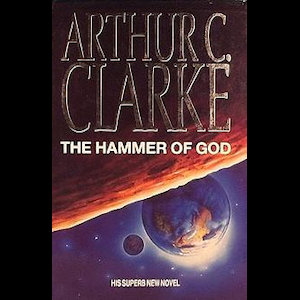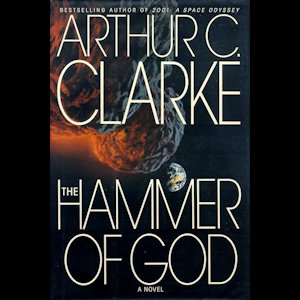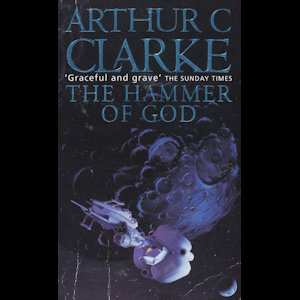The Summer of Arthur C. Clarke: The Hammer of God
Before I begin, welcome to my Summer of Arthur C. Clarke. On the heels of last year's popular Slasher Summer, this year I'm leaving behind the guilty pleasure of the niche horror genre and exploring something a little closer to my own heart: namely science-fiction. Of all the sci-fi greats, none have influenced me more than the late Arthur C. Clarke, my personal favorite of the "Big Three" from the Golden Age of the genre (Asimov, Clarke, and Heinlein). This summer, I am going to look at a few of his most famous works, including the entirety of his 2001 series and the tiny handful of adaptations that have been made for film, television, and video games. Strap in and prepare yourselves for a journey into the stars and the mind, and let us never forget how much richer the world of fiction is for having been blessed by the incomparable Sir Arthur C. Clarke.
 | | Generic sci-fi cover art no. 347 |
A hundred years in the future, one of humanity's greatest fears is being realised: a giant asteroid is heading straight for the Earth, and humanity has only months to figure out how to avert the apocalypse. As the greatest minds in science and engineering come up with a simple solution that seems guaranteed to work, Captain Robert Singh maneuvers his tiny mining vessel to meet the space rock--dubbed Kali, goddess of destruction--with hopes of pushing it out of harm's way. Meanwhile, religious zealots do their best to sabotage the mission and ensure that mankind faces ultimate judgment from the heavens.
When I did my write-up of Rendezvous with Rama a few weeks back, I mentioned that it contained many ideas that could easily be expanded upon and turned into novels of their own. A perfect example of this is The Hammer of God, Arthur C. Clarke's penultimate solo novel and a testament to one of his most lasting real world legacies. Rama opens with a brief chapter describing a system called "Spaceguard" that scans the reaches of the solar system to catalogue every asteroid, comet, and miscellanious space rock that could potentially collide with Earth in the hopes of avoiding disaster.
When Clarke first invented Spaceguard, the idea that the Earth was susceptable to such celestial carnage wasn't really in the public consciousness the way it is today. (A recent Pew survey found that Americans rate the cataloguing of asteroids and coming up with plans to deal with them as NASA's second highest priority, only slightly behind monitoring climate change.) However, after it became clear that the dinosaurs were probably wiped from existence thanks to an asteroid collision, the public started listening to Chicken Little, and NASA eventually set up a system to catalogue any object that could get close enough to Earth to be a threat. They called this system "Spaceguard."
 | | Beware the giant peanut from space |
So it makes sense that Clarke would once again revisit Spaceguard and tell a story about what humanity could do in the worst case scenario, using the best science and hypothetical technology of the near future. His solution is dependant on plenty of advanced warning and is elegant in its simplicity, but he also addresses potential complications alongside the plausibility of using a nuclear missile as a last resort.
The Hammer of God, despite its dour subject matter, reads more like a lighthearted adventure, bouyed by writing that feels almost mirthful, like Clarke is simply having fun. He has become so adept at his craft at this stage of his career that it seems utterly effortless for him. It feels this way even after reading the page upon page of acknowledgements that outline all the work he put into it. In short, Clarke has without a doubt earned his reputation as a master.
That said, the story is unnecessarily padded out (it originally started life as a short story for Time), and it shows. Clarke gives a shout out to Gentry Lee in his acknowledgements, and the extensive backstory of Robert Singh definitely feels like something Lee could have written. It's never boring, however, and the scene describing a young Singh running the moon's first competitive marathon is one of the best moments in the book, even though it has no meaningful relationship to the main plot.
 | | You can actually see the spaceship on this one |
It also tackles religious zealotry in a way that Clarke typically sidesteps. While the central conflict is between the Earth and a peanut-shaped space rock, the secondary conflict is one of faith versus reason. Clarke envisions a wild offshoot of Christianity and Islam (dubbed "Chrislam") that believes Kali, the asteroid, is the reckoning of God and that the efforts of mankind to divert it are an affront to His judgment. Just by doing their job, persisting in their mission, and trying to save the Earth, Singh and his crew are fighting against the very ideals of this dangerous cult. Where Clarke previously tends to dismiss religion through exposition and philosophy, here he confronts it head-on in a visceral, impactful way.
The Hammer of God is a breezy read with a good narrative hook, a relatable protagonist, understandable conflict, and an exciting third act. It's no surprise that, immediately after its publication, Steven Spielberg picked up the film rights and prepared to turn it into a film. The story behind what happened next is complicated, but sufficed to say, the pressures to release a film to compete with Michael Bay's Armageddon forced Spielberg to merge his preliminary outline with a different screenplay about a comet that hits the Earth (a remake of When Worlds Collide) and give the resulting mess to a different director with a tight schedule. What came out of that was Deep Impact, a movie that bares only a passing resemblance to The Hammer of God. Spielberg's distribution company, Dreamworks, used Clarke's name in promotional materials, but ultimately couldn't give him a credit in the film itself. It's a shame, too, because I'd wager a film directed by Spielberg and properly based on The Hammer of God would be far, far better than either Armageddon or Deep Impact.
This brings an end to the Summer of Arthur C. Clarke. It's been an enlightening few months exploring one of my personal idols and his work, and I walk away from the experience with a lot to digest and apply to my own future scribblings. As a result of the wonderful feedback I've received from all of you, I intend to push this blog more into the realm of classic science-fiction reviews, and I promise to eventually review a few more works from Clarke that I wasn't able to get to this summer. But don't worry; I'll still write about comic book movies, slasher cinema, and the occasional Japanese kaiju flick, of course. I sincerely thank all of you who have been along for the ride, and I have high hopes that I'll do something similar next year. I might even tackle another of the Big Three.
-e. magill 8/16/2018
THE UNAPOLOGETIC GEEK'S
SUMMER OF ARTHUR C. CLARKE: | |
|
|
|